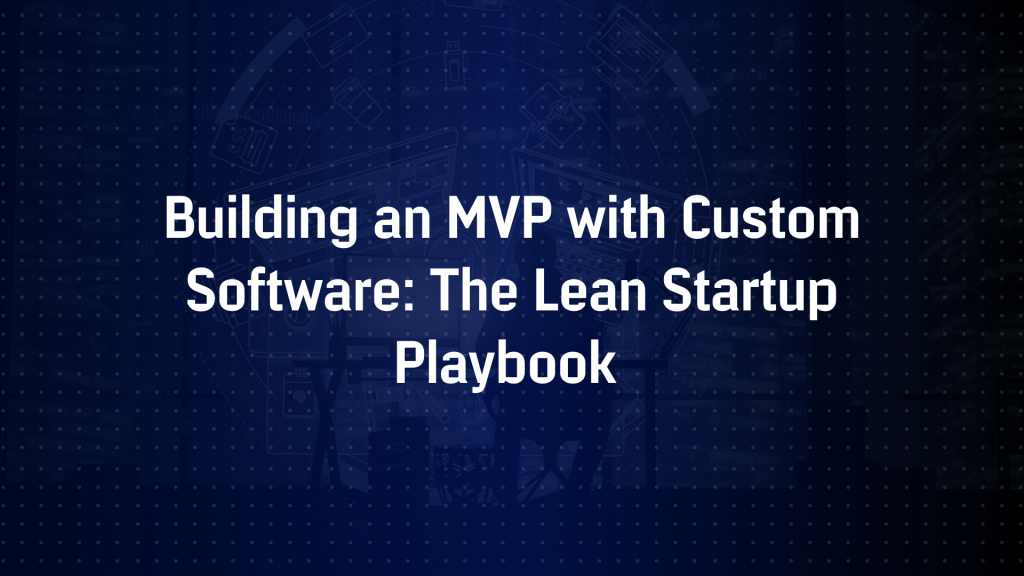How Custom Software Fuels Startup Growth Beyond Seed Funding
You just closed your seed round – congratulations! Now comes the real challenge: scaling up. Investors at Series A/B want to see not just raw growth, but a repeatable, robust engine powering it. This means your cloud and servers must hold up under more users, your team shouldn’t be drowned in busywork, and every decision should be backed by data. In other words, post-seed startups must strengthen their infrastructure, automate workflows, and leverage analytics. Off-the-shelf SaaS tools can help you start fast, but they often constrain your growth. Many startups learn that a custom-built app one tailored exactly to their processes – becomes a strategic asset that scales with the business.
Scaling Infrastructure for Sustainable Growth
After seed funding, your priority is stability. A haphazard tech stack can burn cash and break momentum.
if it falls over under load. Series A investors know this: they look for evidence that your growth isn’t a fluke but can be repeated reliably. In practice, that means moving beyond throwaway prototypes into a production-ready platform. For example, you might migrate from a one-off demo server to a cloud provider (AWS/GCP) and use Infrastructure-as-Code (Terraform, Pulumi) so that every server and database is spun up in a controlled, repeatable way. You’ll also want CI/CD pipelines (GitHub Actions, Jenkins, etc.) to automate builds and deployments safely. As one expert quipped, “A startup is only as fast as its slowest deploy pipeline.”
Automate deployments: Introduce CI/CD and secret management early. Automated pipelines let you push code quickly without manual errors.
Use cloud scaling: Design your app for elastic scaling (auto-scaling groups, load balancers). Custom infrastructure can spin up servers or containers on demand, so traffic spikes don’t crash you.
Monitor & optimize: Add logging, alerts, and cost dashboards. Track DORA metrics like deployment frequency and lead time, plus cloud cost per user. If something breaks, you know immediately and fix it fast.
A lean, automated foundation pays off: it speeds up releases, lowers burn rate, and boosts team productivity. It also sends a signal to investors that your startup is mature and ready for the next round.
Automating Workflows and Operations
Beyond the tech stack, rapid-growth startups face a flood of routine tasks: invoices, customer onboarding, support tickets, data entry, and more. These eat up founders’ time – in fact, research shows founders spend ~36% of their week on admin work that could be automated. That’s time lost on strategy. The solution is to automate everything you can.
Consider how AI and workflow tools can free your team. A recent study found 65% of high-growth Startups use AI workflow automation to outpace competitors. Simple examples include auto-sending onboarding emails, routing leads through CRM workflows, or auto-updating spreadsheets. More advanced workflows use AI: for instance, one fintech founder was spending 16 hours a week processing refund requests. After automating that refund workflow with a small script, they reclaimed 14 hours per week to focus on growth! Even customer support can be augmented by AI: routing tickets based on urgency can cut first-response time and boost satisfaction.
The benefits are clear. Harvard Business Review reports that over 90% of employees say automation has increased their productivity, and most trust it to reduce errors and speed decisions. In practice, workflow automation delivers faster results (“time to value”): onboarding runs smoothly, quoting systems respond in seconds, and manual handoffs vanish. Freeing your team from grunt work not only saves money but also prevents burnout – your best people can spend energy on product and customers instead.
Leveraging Data & Analytics for Decision-Making
Data is your compass for growth. Startups that dig into analytics find trends before they hit you, fix problems fast, and build products customers really want. For example, tracking key metrics like customer lifetime value (CLV), churn rate, and feature usage tells you where to focus. AWS Startups recommends measuring CLV to guide marketing spend, tracking churn to catch product issues early, and monitoring usage stats (active users, session lengths, and error rates) to prioritize features.
Moreover, a strong analytics setup can win over investors. Potential backers want evidence of product market fit and a plan for scaling. Showing real data on growth, retention, and revenue instills confidence that you can adapt and thrive. In short, “data-driven decisions are fundamental for achieving sustainable growth and scaling operations.” To make this happen, build automated dashboards and reports. Use data pipelines or cloud tools (QuickSight, Power BI, etc.) to pull in data from your app, sales platform, and marketing channels. Set alerts for anomalies (e.g., a sudden drop in user signups) so you can act before small issues become crises.
In practice, uncovering data bottlenecks directly drives efficiency. As AWS notes, “By uncovering and addressing underlying issues and bottlenecks, startups can optimize processes, enhance efficiency, and drive sustainable growth.” With custom software you can integrate analytics directly (for example, embed real-time dashboards in your admin portal) or automate data collection. The result is smarter decisions: you’ll know which features to build next, which customers to target, and when to cut costs.
Why Custom Software Is the Secret Weapon
All these post-seed challenges point to one superpower: custom software. Off-the-shelf SaaS tools are cheap and quick to deploy, but they often force you to twist your processes or add on costly licenses as you grow. Custom-built applications, on the other hand, are designed exactly for your needs and vision. They let you automate your unique workflows, optimize performance without waste, and keep full control over data and user experience.
The market reflects this trend. Industry analysts project the global custom software market to jump 22% in 2022 (to over $54B) as startups increasingly opt for tailored solutions. It’s telling that many of today’s giants – Airbnb, Shopify, Stripe, etc.- built their own platforms from day one, treating software as a strategic asset.
The market reflects this trend. Industry analysts project the global custom software market to jump 22% in 2022 (to over $54B) as startups increasingly opt for tailored solutions. It’s telling that many of today’s giants – Airbnb, Shopify, Stripe, etc.- built their own platforms from day one, treating software as a strategic asset.
Key benefits of custom software for scaling startups include
Perfect fit: Every feature matches your business logic. You automate unique processes rather than forcing workarounds.
Built for scale: Your architecture can include elastic cloud scaling, load balancing, and microservices from the start. This means handling traffic spikes or rapid user growth without a complete rewrite.
Full integration:Custom APIs tie together your CRM, website, analytics, mobile apps, and any tools in your stack. No more manual data imports or silos. Everything talks seamlessly.
Faster innovation: You control your roadmap. With agile sprints and continuous deployment, you can push new features whenever your users need them—instead of waiting on a vendor’s update schedule.
Competitive edge:Proprietary features and a unique user experience can set you apart. Using the same out-of-the-box software as everyone else makes it hard to stand out.
Security & control: You own the code and data. For regulated industries (fintech, health, etc.), custom software lets you bake in compliance and encryption from day one. There are no hidden per-user fees – costs become predictable over time.
Research even suggests custom platforms significantly reduce inefficiencies as startups scale. In short, a custom solution evolves with your business. As one Empyreal Infotech blog puts it, custom software “aligns perfectly with startup values: speed of innovation, flexibility, and a lean, efficient operation.”
Empyreal Infotech: Your Growth Partner
Building all this can be a lot for an in-house team to tackle. That’s where a partner like Empyreal Infotech comes in. Founded in 2015 and based in London (with development centers in India), Empyreal is a custom software agency that specializes in helping startups go from seed to scale. They have hands-on experience in fintech, healthcare, e-commerce, and more, and they focus on writing scalable, maintainable code that grows with you.
Empyreal offers an agile, dedicated team model—basically an extension of your own staff. In their words, developers “get to work as if they were employees of the startup,” meaning they deeply understand your brand and vision. They use daily stand-ups, sprint planning, and clear communication so that features roll out smoothly and align with your goals.
On the support side, Empyreal is known for 24/7 global coverage (offices in the UK and India). Clients praise their “exceptional maintenance & support” and round-the-clock availability – issues are fixed immediately, and new releases can happen any time of day. They also keep pricing transparent: flat rate fees with no “rush hour” surcharges or hidden costs, so startups get predictable budgeting.
In practice, this means your startup can focus on customers and growth while Empyreal handles the tech. Whether you need a custom web app, mobile app, or a full enterprise platform, they deliver quality code on your timeline. As one write-up notes, “Empyreal Infotech exemplifies how a dedicated development partner can supercharge these benefits, delivering high-quality, scalable products with unmatched support.”
Key takeaways: After seed funding, building your own custom software is an investment in future growth. It lets you automate workflows, scale infrastructure, and leverage data exactly as you need. And by partnering with experts like Empyreal Infotech, startups can offload the heavy lifting to a team that lives and breathes scalable development. With the right software foundation in place, your Series A/B startup will be poised to turn its ambitions into reality.




